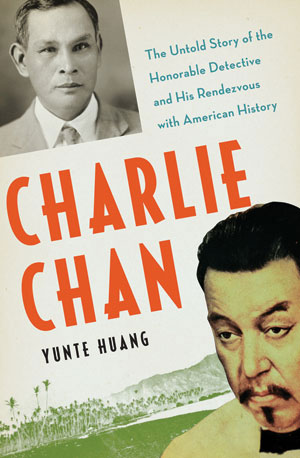Little Things Tell Big Story
by Michael Koh

UB graduate Yunte Huang to lecture on his book about Charlie Chan
Is Charlie Chan an offensive stereotype? To many Asian-Americans, Chan is essentially the “yellow-faced” Uncle Tom. He incredibly emerges as a hero in six detective novels by Earl D. Biggers, stars in 47 Hollywood films between 1926 and 1949, and manages to capture the hearts of the American populace. Chan speaks in the fortune-cookie-esque aphorisms, like “Confucius say…” and he has been portrayed with great success by white actors, but not so much with Asian actors.
Yunte Huang’s recent book, Charlie Chan: The Untold Story of the Honorable Detective and His Rendezvous With American History, published by W. W. Norton, deals with the racial stereotypes and at-first-glance bigotry that Charlie Chan seems to embody.
Huang, a Ph.D graduate of the University at Buffalo, first became entranced with Chan’s allure after he bought two copies of Biggers’ novels at an estate sale. “I had never been to an estate sale,” he recently told NPR. “They don’t really exist in China.” He explained that the Chinese have a stigma against buying secondhand items from the deceased. “I was literally terrified to buy these books, but I did anyway and I took them home—and I was immediately hooked.”
Huang began to research the origins of Charlie Chan and Earl D. Biggers, and was surprised to find that Chan was based on Chang Apana, a real-life Chinese-Hawaiian policeman and detective from 1898 until his retirement in 1932.
Apana, according to an article from 1932, “neither reads nor writes the English or Chinese language. But he is smart and that handicap did not keep him from being one of the best known men on the police force.” Apana carried a bullwhip, wore Panama hats, and smoked cigars. In one instance, Apana is said to have been thrown out of a second story window by drug addicts, only to have landed on his feet. He is also said to have been able to jump from rooftop to rooftop.
“He never used a gun, and was a master of disguise,” Huang told NPR. “One time, he singlehandedly arrested 40 people without firing a shot.” One night Apana arrested 70 gamblers, who all marched in line back to the police station under Apana’s supervision.
Chinese natives tended to be less ambiguous than their American counterparts in their reaction to Charlie Chan. The Chan movie series were a big hit throughout Asia, yet the reactions received in America by Asian-Americans were largely conflicted. “I used to watch a lot of Chinese operas and it is a very common thing in Chinese opera to do these kinds of ventriloquism,” Huang said. “Performing the ‘other’ is part of the artistic culture of China.”
Whether or not Charlie Chan was based on a real character or not, he leaves us with this: “Front seldom tell truth. To know occupants of house, always look in backyard.” lot
Yunte Huang will appear at the on Friday, November 5, 7pm. He will lead a discussion about the work of Maxine Hong Kingston—the next guest in Just Buffalo Literary Center’s Babel series—at Betty’s Restaurant on November 15. For more information, visit www.justbuffalo.org or call 832-5400.
—michael koh
blog comments powered by Disqus|
Issue Navigation> Issue Index > v9n43 (week of Thursday, October 28) > Little Things Tell Big Story This Week's Issue • Artvoice Daily • Artvoice TV • Events Calendar • Classifieds |









 Current Issue
Current Issue